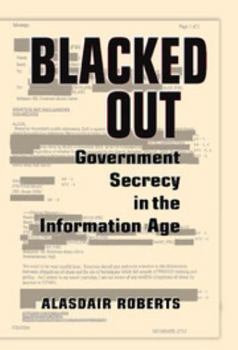Blacked Out: Government Secrecy in the Information Age
Select Format
Select Condition 
Book Overview
In 1966 the United States Congress passed the landmark Freedom of Information Act (FOIA) giving the public the right to access government documents. This right to know has been used over the intervening years to challenge overreaching Presidents and secretive government agencies. This example of governmental transparency has served as an inspiring case in point to nations around the world, spawning similar statutes in fifty-nine countries. Yet, despite...
Format:Hardcover
Language:English
ISBN:0521858704
ISBN13:9780521858700
Release Date:January 2006
Publisher:Cambridge University Press
Length:336 Pages
Weight:1.30 lbs.
Dimensions:1.0" x 6.4" x 9.2"
Customer Reviews
3 ratings
Way before its time.
Published by Thriftbooks.com User , 14 years ago
Alastair Roberts went deep into the meanderings of government transparency provided in the Information Age, from country to country explaining the importance of FOIA--adopted, molded, modified, and abused--laws regarding government secrecy. The balancing act of each country, each culture to release information, sensitive to the security of each is discussed in esoteric detail. The stories told will at first mystify the logical mind, and confuse the already mystified looking for something that makes sense--the author will give you evidence that makes sense. Governments typically do not find it natural to release information that can cause disturbance within policies that protect both the governmental entity and the people at the same time. And since the author is well informed in his knowledge of the intricacies of law and information age, he covers all territories of the subject to professorial status. The newness of FOIA in its different experimental stages worldwide creates problems for all governments, typically overwhelmed by requests, not being able to provide answers in a timely manner, thus frustrating those people who request until ultimately the government becomes lax in its ability to follow the law, reforms it, reducing its effectiveness, until it is excused for its failures. The push and pull of information regarding secrecy in and out of governments, seems too much of a burden. Ultimately, anyone who is interested in the full framework of the disclosure of government information, needs to read this book. Questions that come up as a result of frustration from the average citizen, will be answered fully, as the author gives us examples of how difficult FOIA in its different forms poses.
Unbiased Reading
Published by Thriftbooks.com User , 16 years ago
This book is eye opening, motivating and makes you want to investigate further. Its a great read for everyone no matter what your concentration is. Its keeps you captivated until the end - filled with facts about various organizations and governments! It stimulates conversation in any group setting. Enjoy!!!
Worldwide Exposure
Published by Thriftbooks.com User , 16 years ago
Many Americans are aware of our Freedom of Information Act, but the politics and logistics behind government transparency and citizen access to information are very complicated. In this mostly fascinating book, Roberts tackles the intricacies of this little-understood matter, and gains many unique and practical insights into what "freedom of information" really brings. Amidst comparative coverage of information disclosure statutes and politics in countries around the world (dozens of nations have been inspired by our FOIA), Roberts looks into the tendency of governments towards secrecy, the trend among world populations to demand access to information, and the unexpected burdens that disclosure laws can impose on both politicians and activists. Roberts delves into some surprising areas like government manipulation of the disclosure process to indirectly maintain secrecy, the bureaucratic burdens of disclosure rules amongst different types of governmental bodies, the over-collected nature of government information in the digital age, the lack of transparency amongst private contractors that are now performing governmental functions (such as the operation of prisons), and the trend amongst supra-national bodies (like the World Bank and IMF) to demand American-style disclosure rules in developing nations while refusing to follow such practices themselves. This book is held back from true greatness a bit, because Roberts tries a little too hard to see all sides of the story, and while he is generally in favor of government transparency, his "fair and balanced" regard for certain types of government secrecy prevent the book from reaching a forceful and authoritative conclusion. Another problem is that Roberts misses the opportunity to expand his coverage of the international scene into a worldwide theory of information disclosure, as his coverage of information laws in other countries keeps coming back to conclusions about American political trends. But aside from those structural issues, Roberts certainly illustrates, with great insight, that freedom of information is vastly more complex than most people would realize. Great freedom comes with great responsibility. [~doomsdayer520~]





